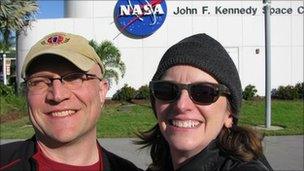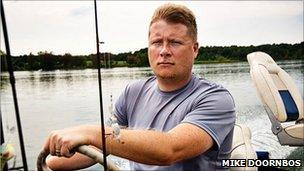US shuttle goodbyes: Your stories
- Published
The final launch of the US space shuttle Atlantis marks the end of an era.
The shuttle, which will be commanded by just four astronauts, is due to lift off from Nasa's Kennedy Space Center in Florida on Friday if the weather is suitable.
The web is alive with space bloggers, some of whom plan to join the crowd at Kennedy Space Center to say goodbye. Here they share their thoughts on what this last journey means to them.
Christy Roberts, Cape Blogger, Maryland

Christy Roberts will be in the crowd watching the shuttle lift-off
Christy Roberts is a 45-year-old married mother of two. She met her husband while working for Nasa at Goddard Space Flight Center in Greenbelt, Maryland.
"We have a fair number of Nasa employees in our area due to our proximity to Goddard, and I'm obviously a Nasa fan - I have been since long before going to work for them.
My first position at Nasa involved providing tracking data to the ground stations around the world that track the space shuttle during launch, orbit, and landing.
I think the strongest emotions I feel about the final shuttle launch are nostalgia and a bittersweet regret.
The folks who have supported the shuttle over the years have a very emotional attachment to the vehicle and the program. In part this is because they take their obligation to the crews that fly aboard them very personally, and also because they've witnessed the vulnerability of the craft through the two associated disasters.
There's a true sense of family for those who work for Nasa and on the shuttle in particular. The space coast in Florida is going to take a tremendous hit from the end of the shuttle programme - it already has.
My regrets are for the lost astronauts, although I'm not sure you can separate that level of risk from space travel. And regret that the shuttle was a bit of an albatross once it was clear it wasn't going to live up to its hype as easy, reliable access to low Earth orbit. I believe it was still a worthwhile endeavour for the lessons learned and technologies gained, but it gets a bad rap from the naysayers.
While it has never become routine to launch a space shuttle, we've had the satisfaction as a country of knowing that the capability was there. I don't love the idea of relying on a [Russian] Soyuz to reach the ISS [International Space Station]. I see the need to move on from the shuttle, but it was a big part of my young adult and early married life, and I've been surprised by how emotional I've felt about it all ending.
My husband, kids and I are flying down to Florida on Thursday.
I had seen a launch from this location with my husband just before we were married in 1992, and it was important to me for my kids to see one if at all possible. It's a truly incredible experience.
We won't be close enough this time to see it lift off the pad, but even from 8 or so miles away, it will light up the sky and roar away from Earth. We learned from the last launch that driving will be a mistake on launch day. It was a nightmare then, and that's nothing compared to how it is going to be this time. We will stick to bikes to navigate the chaos.
I have very vivid memories of the first shuttle missions. I was 15 when Columbia first lifted off. Based on those impressions and having an aptitude for science and math, I knew when I graduated from high school that I wanted to be a part of the space program.
Boldest memory? Unfortunately, the one most seared in my mind is the explosion of Challenger. I was a college student studying physics with hopes of working for Nasa in a couple of years. I remember walking through the student centre on my way to the physics building and seeing masses of students standing in front of the televisions watching in disbelief. It was one of those events that shakes the psyche of a nation. When I went to work for Nasa, it was just after the Return to Flight HST [Hubble Space Telescope] mission, and things were back on track, but my Nasa friends who were on console that day are still haunted by it.
I think the end of the shuttle program is like any other chapter we close in our lives or careers. We take what we've learned and move on to the next thing. I guess it can be debated whether manned flight to Mars or elsewhere outside low Earth orbit is of immediate value to humankind, but I have to believe it will be eventually, and it's no small task, so we better get cracking.
Fingers crossed for a break in the predicted thunderstorms at just the right moment or for a clearer shot on Saturday."
Anna Leahy and Doug Dechow, Lofty Ambitions, California

Anna Leahy and Doug Dechow were born just as the space race began
Lofty Ambitions focuses on aviation and spaceflight, science of the 20th Century and beyond. Anna Leahy, a poet, and Doug Dechow, a science librarian, write the blog as a couple.
"We're really sad to see the space shuttle programme end. It's not undeserving of criticism, but it's an amazing machine and amazingly complex machine. It's something we appreciate even more, having seen two not-launches and a launch in person. It represents human potential.
That said, the future wasn't possible while the space shuttle was still actively doing its work. The end of one programme allows for the beginning of a new era.
We've had media credentials for all three of the final missions and we'll watch the launch from the News Centre which is about 3.1 miles (5km) from the launch pad. It's just about as close as any spectators can get.
We'll be standing next to that countdown clock everyone sees on TV. Some reporters there have been covering the space programme for decades, and they are a wonderfully quirky and knowledgeable bunch with whom to follow this last mission.
We were born just as the space race got going, so our lives and US manned spaceflight span the same timeframe. Doug's first memory is of the black-and-white televised images of Neil Armstrong and Buzz Aldrin walking on the moon's surface.
We were in college when the Challenger accident occurred, so that was the first national tragedy we experienced as adults. When we moved to the Washington, DC, area, our first outing was to the National Air and Space Museum. We're really fascinated by how Apollo and the space shuttle work as historical and technological moments, and that stems from our childhood curiosity.
The Atlantis shuttle preparing for it's final launch. Video: Doug Dchow and Anna Leahy, Lofty Ambitions
When we started looking at the space shuttle programme in depth, we hadn't realized what an accomplishment the International Space Station is, both in terms of the science that's been done there and will continue to be done over the next several years and in terms of the global nature of the effort. A lot of countries - the United States, Russia, countries in Europe, Japan, and Canada - collaborated on the ISS, and it can serve as a lesson for future positive collaborations without leaving terra firma.
The best launch, of course, was that of STS-134, Endeavour's last launch. It's the best because that's the one we saw in person. We live in southern California; that's where the orbiters were built, and Endeavour is coming home to the California Science Center in Los Angeles.
We knew the launch would be loud, but what's amazing is how you see the exhaust billowing out before the sound was able to travel the three miles to where we stood. Considering it was that far away, the sound was very loud. Within 800 feet of the launch pad, the sound alone can kill you. There was low cloud cover for Endeavour's last launch, and it looked as if the cloud reached down to suck the spacecraft in. And then we felt the heat from the lift-off—at three miles away.
The end of the space shuttle program does not mean the end of space exploration by the United States. Nasa has unmanned missions ongoing, the Russians are able to ensure human travel between Earth and the ISS, and the private sector is actively working on the future of manned spaceflight, with surprising success thus far. We should remember that there was a lag between Apollo and the space shuttle too. This summer is not the end of everything in space for the United States. In fact, it invites global collaboration in maintaining a human presence in space."
Mike Doornbos, EvaDot, Washington DC

Mike Doornbos is relieved that this is the final launch
Mike Doornbos created the Evadot website. It is focused on sustainable and pragmatic access to space exploration for everyone worldwide.
"I feel relieved that this is the final launch for Atlantis. The shuttle programme has been a barrier to long-term sustainable exploration. While an interesting and complex experiment, it did not accomplish the lower-cost, more frequent access to orbit it was built for. The program should have been replaced in the 1990s with a craft more suited for that original goal.
I've only been alive since shortly before the shuttle was first launched. When I was young, it seemed like we were poised for human exploration of the solar system, and as I've gotten older, it seems like we're just keeping a program in place to keep politicians re-elected and keep jobs in place even at the expense of progress.
I vividly remember the Challenger disaster. Not only because of the tragedy, but because we spent time getting to know our explorers. We felt like we knew those people. Their hopes, dreams, fears, and experiences. Today we've dehumanised space and as a result the average person doesn't pay attention.
I'm hopeful for an opportunity for open access to space. The government's role should be to assist its citizens to create a commercial industry in space. I will probably watch this launch on Spacevidcast.com."
- Published6 July 2011